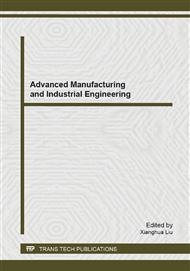[1]
J.H. Holland, Adaptation in Natural and Artificial Systems. University of Michigan Press, Ann Arbor, MI, (1975).
Google Scholar
[2]
Fred Glover, Harvey J. Greenberg. New approaches for heuristic search: A bilateral linkage with artificial intelligence. European Journal of Operational Research 1989, 39(2): 119-130.
DOI: 10.1016/0377-2217(89)90185-9
Google Scholar
[3]
S. Kirkpatrick, C. Gelatt, M. Vecchi. Optimization by simulated annealing. Science 220, 1983, pp : 671-680.
DOI: 10.1126/science.220.4598.671
Google Scholar
[4]
M. Dorigo, V. Maniezzo, A. Golomi, Ant system: optimization by a colony of cooperation agents, IEEE Transactions on SMC, 1996, 26(1): 29-41.
Google Scholar
[5]
J. Kennedy. R. C. Eberhart. Particle swarm optimization, in: Proceeding of IEEE International Conference on Neural Networks, 1995, p.1942-(1948).
Google Scholar
[6]
R. storn, Differential evolution design of an IIR-filter, in: IEEE International Conference on Evolutionary Computation, Nagoya, 1996, pp.268-273.
DOI: 10.1109/icec.1996.542373
Google Scholar
[7]
Geem Z W, Kim J H, Loganathan G V. A new heuristic optimization algorithm: Harmony search [J], Simulation, 2001, 76(2): 60-68.
DOI: 10.1177/003754970107600201
Google Scholar
[8]
Mahdavi M, Fesanghary M, Damangir E. An improved harmony search algorithm for solving optimization problems [J], Applied Mathematics and Computation, 2007, 188(2): 1567–1579.
DOI: 10.1016/j.amc.2006.11.033
Google Scholar
[9]
Chia-Ming Wang, Yin-Fu Huang. Self-adaptive harmony search algorithm for optimization. Expert Systems with Applications, 2010, 37(4): 2826-2837.
DOI: 10.1016/j.eswa.2009.09.008
Google Scholar
[10]
Zong Woo Geem, Kwee-Bo Sim. Parameter-setting-free harmony search algorithm. Applied Mathematics and Computation, 2010, 217(8): 3881-3889.
DOI: 10.1016/j.amc.2010.09.049
Google Scholar
[11]
Omran M G H, Mahdavi M. Global-best harmony search [J], Applied Mathematics and Computation, 2008, 198(2): 643-656.
DOI: 10.1016/j.amc.2007.09.004
Google Scholar
[12]
Pan Q K, Suganthan P N, Tasgetiren M F, Liang J J. A self-adaptive global best harmony search algorithm for continuous optimization problems [J], Applied Mathematics and Computation, 2010, 216(3): 830-848.
DOI: 10.1016/j.amc.2010.01.088
Google Scholar
[13]
Zou D X, Gao L Q, Wu J H, Li S. Novel global harmony search algorithm for unconstrained problems [J], Neurocomputing, 2010, 73(16-18): 3308-3318.
DOI: 10.1016/j.neucom.2010.07.010
Google Scholar


